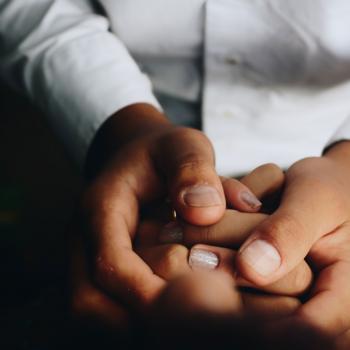Everyday Messages that Excuse Bad Behavior and Promote Rape Culture and What We Can do About it
by Nadiah Mohajir
 As a follow up to Sobia Ali-Faisal’s post, I’d like to explore a little deeper on how misogyny has become a part of our everyday culture.
As a follow up to Sobia Ali-Faisal’s post, I’d like to explore a little deeper on how misogyny has become a part of our everyday culture.
In the last year, I have had two parents reach out to me about incidents at their childrens’ schools. Both were young girls not even yet in upper elementary school, at two different schools, yet both situations were eerily similar. In the case of one girl, the male classmate made a series of extremely graphic comments to her. The other girl had the unfortunate experience of her male classmate poking her repeatedly in her private parts.
Both of these girls are blessed with incredible proactive and concerned parents and teachers, who did all the right things by informing the right people and are looking into effective disciplinary action. In the case of both boys, their parents’ response was less than ideal. In one case, the mother wasn’t able to attend a meeting with school officials with the level of urgency she should have given the situation. In the case of the other, the parent’s justified their son’s behavior as “bratty behavior” and “he didn’t mean it THAT way”
The frequency with which these incidents are happening, and with such young children, has a number of considerations. First, our tendency in society is to take a “boys will be boys” attitude, which has normalized violence against women and girls. Second, how we (as parents, as administrators, etc) respond to such situations can inform future attitudes and behaviors. Finally, we must start and continue to have conversations with our children of all ages about sexual abuse, about consent, about boundaries. Both about how we should protect ourselves, but more importantly, about how we have a responsibility to respect other people’s boundaries.
The fact that this messaging is all around us, in the media, on the radio, and even on the clothing we buy our children makes it a much harder battle to fight. For example, among the many options for full sleeve graphic t-shirts for boys OldNavy.com, was one with the age-old idiom “boys will be boys.” For me, this was a demonstration of how subtly interwoven gender stereotypes and rape culture is in our society: not only is this a commonly used phrase in every day language, but cute marketing and product placement strengthen this messaging by reinforcing and normalizing it.
Before I continue to talk about why I find this messaging so problematic, let’s first talk about how its typically used. The proverb is generally to refer to the idea that boys are expected to be irresponsible or boisterous. So consider the following examples:
- You host a playdate for your son and two of his male friends. After a couple of hours of playing in the basement, you discover the room to be a mess and several toys to be broken. The other parents laugh it off and shrug “After all, boys will be boys”
- A teen girl suffers from being harassed at school. Often, boys catcall and whistle at her when she walks by. She complains to her neighbor, who shrugs her shoulder advising her to “lighten up. They’re just hormonal boys. Boys will be boys.”
- Your daughter is quietly playing in the sandbox at a birthday party when her cousin charges into the yard and dumps a bucket of water on her, causing her to be greatly upset. You and your sister, the boy’s mother, try to calm her down, and your sister, with the best of intentions, explains “I’m so sorry sweetheart. He’s just, you know…being a boy. They’re just like that.”
There are countless more examples of how this idiom is used on a daily basis. The above examples likely sounded familiar to you and I encourage you to continue to think of how this idiom has been used either by you or in your presence in the past. So why is this messaging so problematic? How does it subtly contribute to gender stereotypes and rape culture?
- “Boys will be boys” assumes that being born male predisposes one to irresponsible or inappropriate behavior. This attitude sends the message that boys are almost expected to mess up, behave irresponsibly, or worse, aggressively. While boys may have a greater likelihood of preferring certain types of physical and active play, there is absolutely no research that shows that correlated to a greater likelihood of exhibiting aggression, cruelty towards others, or any other inappropriate behavior. By continuing to reinforce this idea, we are indirectly contributing to this misinformed belief that boys are expected to behave a certain way. In addition, as Dr. Meyer explains in this article, the expression actually “attempts to explain away aggressive behaviors that a small number of children exhibit by linking it with ‘natural’ or ‘biological’ impulses, without examining other reasons for the aggression.” The result is that we often end up ignoring other factors such as environmental, social and individual factors that are likely contributing to the aggressive behavior.
- It essentially excuses boys from behaving badly or hurting others and does not teach accountability, but rather, removes responsibility. Approaching normal, common situations such as the ones described above with a “boys will be boys attitude” excuses boys from behaving badly or hurting others and removes accountability. Boys are no longer expected to take true responsibility for their behaviors because such behavior is expected from them. If boys hear this messaging from a very young age, they may become accustomed to not being responsible for their bad behavior. Not only does this build bad lifelong habits where one is used to not taking ownership for any actions, it also promotes violence, especially against women. If boys are meant to be aggressive and physical, then it is okay to express their emotions in a very physical and aggressive way, and not have to answer for it, because “boys will be boys.”
- It reinforces gender stereotypes. Because this phrase generally sets the expectation for boys to behave a certain way, it reinforces gender stereotypes by allowing people to internalize these attitudes which ultimately shape the way people interact with each other. Girls who behave similarly are seen as “aggressive” while boys are just behaving like boys. Moreover, it also promotes gender inequality when referencing domestic expectations. A boy who chooses not to complete his chores of washing the dishes may be excused by “boys will be boys” while girls would generally not be given the same leeway.
Not pushing back on this messaging – whether by challenging media and marketing, or by challenging the way the above-mentioned situations are handled in real situations such as at school – has dire consequences and creates an environment that ultimately is ripe for violence against women.
So what can we start doing to change the status quo?
- Respond with an expectation of accountability. When a child or young person behaves inappropriately – with aggression, or cruelty or the like – we should respond in a way that says this is not ok, and we expect better from you. Not addressing such behavior creates a culture that lacks accountability and dismisses bad behavior based solely on gender. In the most extreme circumstances, it is this very attitude that facilitates an environment that is ripe for abuse, and for such behavior to be shoved under the rug. Of course, the course of action is dependent on each unique situation, and certain disciplinary approaches may be effective in one situation but completely irrelevant in another.
- Stop making excuses. We have to stop making excuses for misogyny just because there aren’t any other alternatives. There aren’t any alternatives because we just haven’t worked to commit to implementing them yet. Developing long term, effective strategies to combat rape culture and violence against women requires an interdisciplinary approach. For example, to address school-based incidents, it would be important to bring together sexual violence experts, educators, administrators, and parents to work toward a strategy that makes sense for all.
- Teach your children about consent and boundaries. Start these conversations as early as the age of 3 and take advantage of teaching moments. Honor your child’s wishes if he/she does not want to kiss or hug a relative. At the same time, teach your child to ask for permission before hugging or rough-housing with a peer, and to respect them when/if they say no. For a more detailed discussion on how to have age-appropriate conversations with your children, please refer to this parent’s guide.
It is our collective responsibility to work toward making this change. Our children deserve better. Our communities deserve better. We can no longer can afford to keep dismissing these attitudes and behaviors simply because it’s easier and seems effective in the short term. As Jennifer Hicks, parenting blog author said, “We have to replace ‘boys will be boys’ with a much more acceptable idea: Boys will be what we expect them to be.”












